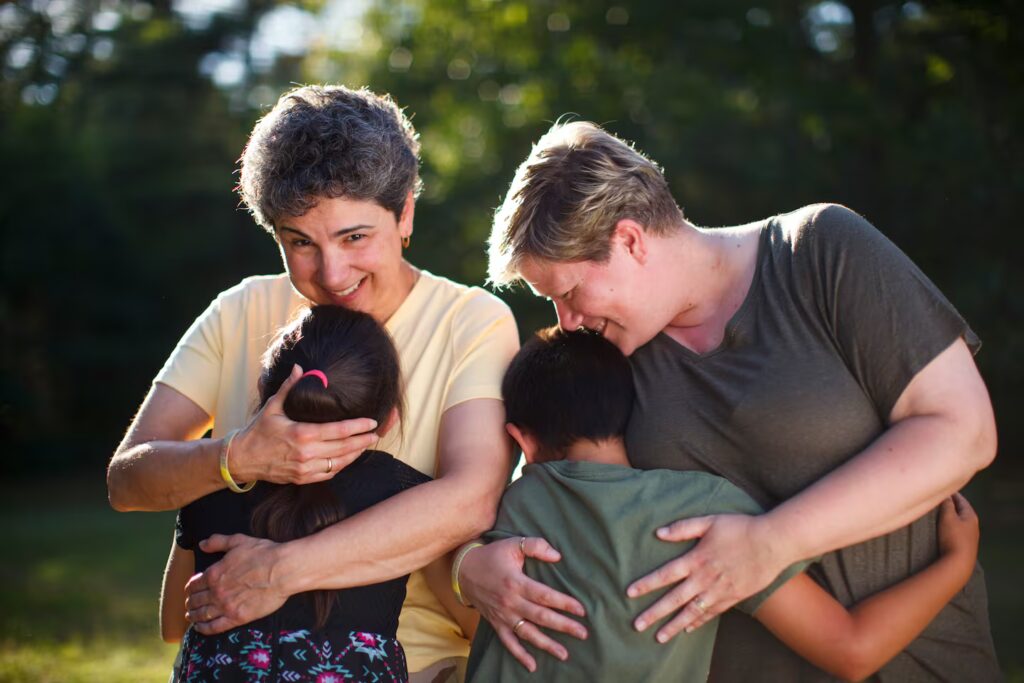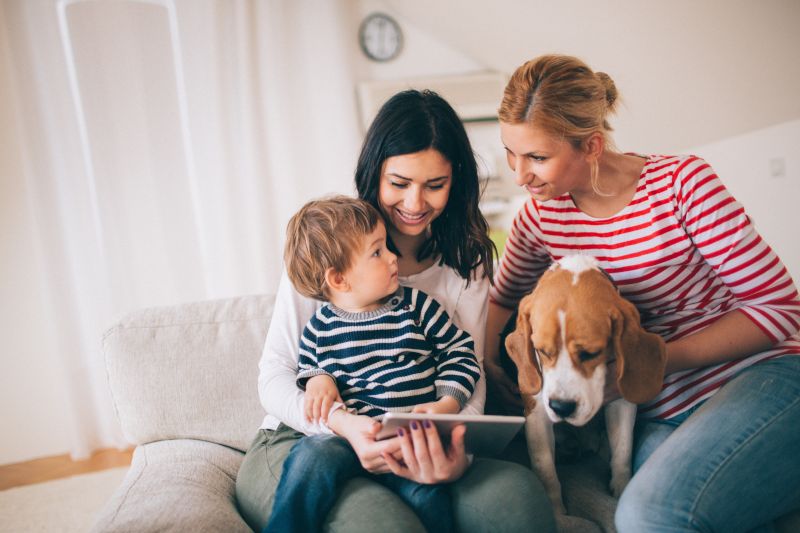Key Takeaways
- Same-sex couples have had full adoption rights in Massachusetts since 1993, with further protections under the 2024 Parentage Act.
- Joint and second-parent adoptions are available with similar timelines and requirements as opposite-sex couples.
- The process includes background checks and other steps. It usually takes 9 to 24 months.
- Expect to pay $10,000 to $40,000. Help is available to make it more affordable.
- International or out-of-state adoptions may have other hurdles to get over; legal guidance is recommended.
Same-sex couples should have the same right to adopt children as opposite-sex couples. Unfortunately, that hasn’t always been the case. That began to change in the 1990s.
Today, same-sex couples in Massachusetts have had equal adoption rights since 1993, thanks to the Adoption of Tammy case and the landmark 2004 Goodridge v. Department of Public Health decision that legalized same-sex marriage in the state.
The U.S. Supreme Court’s Obergefell v. Hodges ruling expanded these rights across the country in 2015. In 2024, the Massachusetts Parentage Act expanded protections for LGBTQ+ families by streamlining parentage recognition, especially in cases involving assisted reproduction or surrogacy.
Massachusetts law treats same-sex adoption the same as opposite-sex, allowing joint and second-parent adoptions through the Probate and Family Court. However, out-of-state and international adoptions may vary depending on agency policies and local laws, so you need to check each agency’s reputation before choosing one.
For tailored local guidance, explore LGBTQ+ family law in Worcester.

What Types of Adoption Are Available to Same-Sex Couples in Massachusetts?
Same-sex couples in Massachusetts can pursue joint adoption, second-parent adoption, foster-to-adopt, or private/independent placements.
Joint adoption lets both partners adopt a child together, often through agencies or foster care. Second-parent adoption lets one partner adopt the other’s biological or previously adopted child.
The Department of Children and Families (DCF) helps foster-to-adopt arrangements, which account for 30 to 50% of same-sex placements. Private agencies or attorneys can also handle independent adoptions.
Same-sex couples represent 20 to 25% of adoptive families in Massachusetts. Even with those protective laws, some agencies may still be biased.
Massachusetts law about adoption provides more on these options.
Is Joint Adoption Different from Second-Parent Adoption?
Joint adoption involves adopting a child who is not biologically related to either parent, while second-parent adoption is for a partner to adopt their spouse’s or partner’s biological or legal child.
In a joint adoption, both parents file a petition with the agency. In second-parent adoption, one parent is already legally recognized, and the other is applying for legal status through a court petition. Joint adoption generally takes 12 to 24 months, while second-parent adoption can take 6 to 12 months. Both require consent from the biological parent and approval by the Probate and Family Court.
Learn more about biological rights through establishing parentage in Massachusetts.

How Does Surrogacy or Donor Conception Factor In?
Surrogacy and donor conception often involve pre-birth parentage orders and may lead to second-parent adoption post-birth for legal recognition.
Roughly 40 to 60% of same-sex adoptions involve assisted reproduction. If only one parent is biologically connected, a second-parent adoption formalizes things. You can get pre-birth parentage orders during pregnancy to establish legal parenthood at birth.
Using donor gametes or gestational carriers does add legal complexity that you should know about. Make sure to get a professional to look over anonymity clauses and donor agreements.
What Are the Eligibility Requirements for Same-Sex Couples to Adopt?
Same-sex couples have to be over 18, live in Massachusetts, and show they have stable income and housing.
You don’t need to be married, thanks to marriage equality laws. All prospective parents must pass background checks, including CORI (Criminal Offender Record Information) and SORI (Sex Offender Registry Information). A social worker will also gauge your fitness to adopt.
Be prepared to show documentation of your home environment, finances, and relationship stability. Legal guidance can help you understand what to expect and make the process easier.
GLAD’s guide to second-parent adoption offers LGBTQ+-specific insights to help you understand what to expect.
Do Same-Sex Couples Face Additional Requirements?
Same-sex couples aren’t held to higher legal standards, but some agencies might ask for more references or documentation.
The Massachusetts Parentage Act helps make sure same-sex couples get uniform treatment, but in 10 to 20% of cases, couples report needing to offer additional evidence of stability. However, home studies follow the same format for all families.
Reference letters, income documentation, and shared legal responsibilities can help strengthen your case.

How Does the Adoption Process Work for Same-Sex Couples?
The adoption process for same-sex couples includes selecting an agency or type, applying, completing a home study, matching and placement, post-placement supervision, and finalization in court.
After choosing the type of adoption, you’ll complete an application and undergo a home study involving 3 to 6 visits. Once a match is found, you may meet the child before placement. Post-placement monitoring lasts 6 to 12 months, with a final court hearing to complete the adoption.
Private adoptions may cost $10,000 to $40,000, but foster-to-adopt is often free or even subsidized. The full process usually takes 9 to 24 months to wrap up.
For families considering other options, see guardianship alternatives in Massachusetts.
What Happens During the Home Study?
The home study includes interviews, safety inspections, and documentation checks to evaluate parenting readiness.
You’ll meet with a social worker over 4 to 8 hours total. They’ll assess your relationship, home safety, finances, and motivations for adopting. Your sexual orientation won’t be a factor. The focus is on your ability to parent.
Most applicants are approved on the first try, with approval rates between 70% and 85%.
More details are available at Massachusetts adoption information.
How Are References and Background Checks Conducted?
You’ll need 3 to 5 personal references and then pass fingerprint-based CORI and SORI background checks.
References are interviewed about your parenting skills, character, and relationship. Background checks usually clear within 2 to 4 weeks. If you have any record, you’ll need to explain the circumstances. Full transparency is important here, so be upfront about anything in your past.
What Matching and Placement Steps Occur?
Agencies match children with families based on home study findings and preferences, and pre-placement visits and open adoption agreements follow.
In open adoptions, birth parents may select the adoptive family. Same-sex couples are protected from discrimination, but preferences vary by agency. About 50 to 70% of adoptions involve some contact with the child’s birth parents.
When selecting an agency, double-check their inclusivity history and their approach to open adoption.
Explore child placement considerations in Massachusetts for related legal insights.
How Does Post-Placement Supervision Work?
Post-placement supervision includes monthly visits to judge how well the child is adjusting and your family dynamics.
You can expect to have visits over 6 to 12 months. Social workers make sure the match is successful and may offer resources if you’re experiencing parenting challenges. The finalization hearing can only occur after a successful post-placement period.

What Costs and Financial Assistance Are Involved?
Private agency fees cost $20,000 to $35,000, legal fees range from $2,000 to $5,000, and home studies may cost you $1,000 to $3,000, but financial assistance is available from the federal government in the form of tax credits.
Federal tax credits of up to $14,890 can help offset expenses. Foster-to-adopt placements are often subsidized, and some grants target LGBTQ+ adoptive families.
Make sure to budget for hidden costs like travel or post-adoption counseling. A financial advisor can help you plan for these.
See family tax benefits in Massachusetts for further savings opportunities.
What Challenges Might Same-Sex Couples Encounter?
Same-sex couples may face implicit bias, longer wait times, or legal hurdles in other states despite strong protections in Massachusetts.
Although rare, 5 to 10% of couples report delays due to discrimination. Some states are still unfriendly to LGBTQ+ adoption, so interstate adoptions may be more complex and definitely require more research on your part.
Choose affirming agencies and legal support to help you avoid setbacks. See family planning mistakes in Massachusetts to avoid common pitfalls.
How Can International Adoptions Differ?
International adoptions require compliance with the Hague Convention, and many countries ban or restrict same-sex couples.
Even after a child is adopted abroad, Massachusetts has to finalize the adoption post-immigration. Costs often exceed $30,000 to $50,000, and legal complexities are higher here, too.
Make sure you verify each country’s LGBTQ+ adoption stance before proceeding.
What Post-Adoption Support Is Available?
Post-adoption resources include counseling, support groups, and legal services for birth certificate amendments and parenting plans.
The Parentage Act makes sure that your union is legally recognized, and around 40 to 60% of adoptive families look for support services post-finalization. Don’t hesitate to use community or agency networks.
Find out more about parenting support in Massachusetts.
Frequently Asked Questions
Do same-sex couples wait longer to adopt in Massachusetts?
Not typically, but some agencies report longer waits for LGBTQ+ applicants based on birth parent preferences.
Can birth parents discriminate against same-sex adopters?
No, discrimination is illegal, but preferences may still influence matches in private placements.
What if one partner has a criminal record?
It depends on the offense. Minor records can be explained, but abuse or neglect convictions may disqualify you.
Are there grants for same-sex adoption costs?
Yes. Several organizations offer grants to LGBTQ+ families. Check with your agency.
How does adoption affect immigration for international children?
U.S. Citizenship and Immigration Services must approve the adoption, and Massachusetts courts finalize it afterward.

Michelle Murray has devoted her practice exclusively to family law matters, focusing her efforts on assisting clients through divorce, custody, property division, child support, spousal support, and visitation issues throughout Worcester County.
